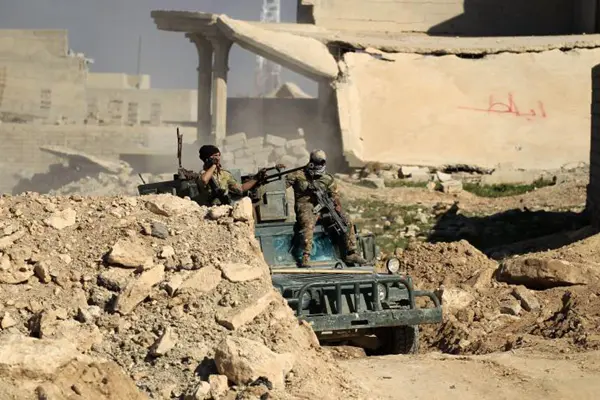U.S.-backed Iraqi forces closing in on the Islamic State-held western half of Mosul prepared on Tuesday to storm the airport and a nearby military base on its southern outskirts to create a bridgehead for a thrust into the city.
Since ousting the militant group from eastern Mosul last month, Iraqi forces have advanced in sparsely populated outlying areas but fighting will intensify as they near the teeming inner city of western Mosul and the risk to roughly 750,000 civilians there will rise.
The U.S. military commander in Iraq has said he believes
U.S.-backed forces will retake both of IS's urban bastions - Mosul and Raqqa in neighbouring Syria - within the next six months, which would end the jihadists' ambitions to territorial rule three years after they declared a "caliphate".
Iraqi federal police and elite interior ministry units known as Rapid Response have made rapid progress towards western Mosul in a sweep from the south through stony desert terrain since launching the offensive's second phase on Sunday.
After fighting their way with helicopter gunships, machine gun fire and rocket-propelled grenades to Albu Saif on Monday, Iraqi forces were building up their positions in the hilltop village that overlooks the airport and built-up western Mosul beyond, a Reuters correspondent reported from the area.
The corpse of an Islamic State insurgent with a missing leg lay in the street of Albu Saif village.
Iraqi forces reached the "vicinity" of Mosul's international airport on Monday, the military said. A Rapid Response spokesman said the airport, once retaken, would be a close-support base for the onslaught into the west of Iraq's second-largest city.
Iraqi forces will also need to secure the Gozhlani military complex, which includes barracks and training grounds and sprawls across the area between the airport and the end of the Baghdad-Mosul highway.
A senior Iraqi official said the airport and Gozhlani base had been heavily damaged by U.S.-led air strikes to wear down IS militants ahead of the offensive. He said Iraqi forces did not anticipate much resistance at the airport or base especially as the area was exposed to air strikes and artillery bombardment.
"The next step, God willing, is to advance to the Ghozlani military base," said Rapid Response Captain Mohammed Ali Mohsen, speaking inside a house where the IS slogan, "The Islamic State is Staying", was scrawled in marker pen on the walls.
The Counter-Terrorism Service, Iraqi units trained by the United States for urban warfare and which spearheaded the recapture of east Mosul, are expected to surge into the city's west once regular forces clear access points.
Iraqi commanders expect the battle to be more difficult than in the east of Mosul, however, in part because tanks and armoured vehicles cannot pass through narrow alleyways that crisscross the city's ancient western districts.
Militants have developed a network of passageways and tunnels to enable them to hide and fight among civilians, melt away after hit-and-run operations and track government
troop movements, according to inhabitants.
The U.S. commander in Iraq, Army Lieutenant General Stephen Townsend, told a news conference in Baghdad on Monday he had been placing U.S. military advisers closer to front lines in Mosul.
Speaking with reporters in Washington on Tuesday, Pentagon spokesman Captain Jeff Davis said Iraqi forces had retaken over 125 square kilometres (48 square miles) from Islamic State since Sunday.
Davis said the Pentagon would present a preliminary plan for accelerating the fight against Islamic State to the White House early next week. He said the plan would look not only at Islamic State in Iraq and Syria but other areas where it has sprung up.
Islamic State is essentially under siege in western Mosul,
after being driven out of city districts east of the River Tigris after 100 days of heavy fighting ending in January.
IS has prevented residents from leaving but in the first two months of the Mosul campaign, in October and November, it forced thousands of villagers to march alongside its fleeing militants as human shields against air strikes.
(REUTERS)
 简体中文
简体中文

